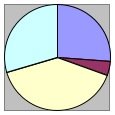where your iTunes $$$ goes
 Some artists are suing Sony, saying they were scammed out of royalties. These bands (Cheap Trick, the Allman Brothers) signed their contracts long before the advent of online sales, but still, seeing where the money goes is surprising to me.
Some artists are suing Sony, saying they were scammed out of royalties. These bands (Cheap Trick, the Allman Brothers) signed their contracts long before the advent of online sales, but still, seeing where the money goes is surprising to me.When you buy songs on iTunes, this is where your money for each 99 cent track goes, according to an AP article
- 30 cents: Apple's share
- 70 cents: what the artist and record label divvy up—with Sony, at least
- of what Sony gets from Apple...
- 40 cents: the amount Sony automatically keeps, regardless of what kind of deal they have with the artist
- 26 cents: the part artists are alleging Sony scammed them out of, since the record label calls the songs "sales," rather than "licenses," so Sony is able to pay the artists less so they can recoup material costs (making the records, packaging, etc.)
- 4.5 cents: what these artists are getting (that's the maroon sliver on the pie chart)
I've wondered how the breakdown works for emusic, which is where I get nearly all of my music now. Songs there cost only 20-30 cents each, depending on the kind of subscription you get. Plus when you buy from emusic, they don't have any restrictions on how you use the songs (either on paper, or in the form of electronic rights management).
My theory is that when songs are cheaper, people will simply download more of them, probably enough to counteract the low prices. Then artists will still get paid, and everyone gets more music. Yay!













0 Comments:
Post a Comment
<< Home